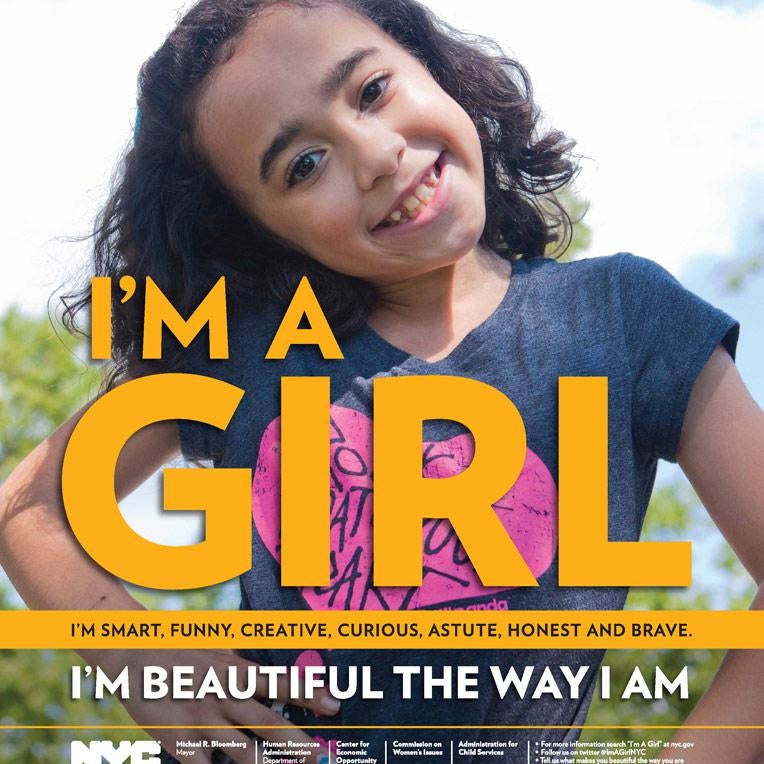New York City has unveiled a new public health drive to improve girls’ self-esteem and body image. The $330,000 campaign, called the NYC Girls Project, kicked off Monday with bus and subway ads starring 21 amateur models of different races and sizes (some are the daughters of city workers) giggling, beaming, playing the violin, palming a basketball, or flexing their arms. “I’m a leader, adventurous, outgoing, sporty, unique, smart and strong,” say the signs. Or: “I’m funny, playful, daring, strong, curious, smart, brave, healthy, friendly and caring.” Or: “I’m clever, adventurous, outgoing, unique, smart and strong.”
The initiative, tagged with the slogan, “I’m Beautiful the Way I Am,” comes from Mayor Michael Bloomberg by way of his deputy press secretary Samantha Levine, who told the New York Times that she’d been inspired to tackle pop representations of female beauty after hearing about little girls donning shapewear and getting plastic surgery. (She also called out a Dear Sugar advice column in which Cheryl Strayed bemoaned women’s obsession with their bejeaned butts as a feminist failure.) And campaign organizers have cited painful statistics: that “more than 80 percent of 10-year-old girls are afraid of being fat” and that “girls’ self-esteem drops at age 12 and does not improve until 20.” Hopefully bombarding kids with uplifting signs in the subway will help counteract the body image pressures that lead to these depressing factoids.
In case they don’t, the movement, which targets girls 7 through 12, will also involve physical fitness classes, an after-school pilot program addressing self-esteem issues for girls, and the Twitter campaign #ImAGirl. Plus, according to the New York Times “a 30 second video will be shown in taxis, on YouTube and on the campaign’s web site.”
This initiative gets so many things right. But to pick a nit, what’s with the slogan? As Kat Stoeffel at the Cut notes, “There’s something slightly contradictory about the NYC Girls Project message—‘Don’t worry about how you look. You look beautiful!’ ” Isn’t the point of the program to encourage girls to disassociate their sense of worth from their physical appearance? Why couldn’t the slogan simply be, “I’m Awesome the Way I Am?”
We have poured tons of time and energy into reclaiming the word beautiful for women everywhere. “You’re beautiful,” we assure one another, differentiating as needed between some starlet’s “conventional beauty” and our friend’s “unique, nontraditional” allure. We talk confusingly about inner loveliness when what we really mean is strength, ebullience, or compassion. Let’s cut our losses with trying to redefine beauty and decathect. Society will always slap us with arbitrary appearance-based standards, and some people will always fail to meet them, whatever they are. And so what? We’re only making the problem worse by pretending this isn’t so.
For some girls, the slogan “I’m Beautiful the Way I Am” is a lie. And surely, all else being equal, most of us would rather be beautiful than not. But all else being equal, I would also rather have 20/20 vision or a black belt in karate. Society’s solution for people like me is not to say, “You are perfectly-sighted/skilled in martial arts just the way you are.” Why? Because needing glasses or lacking karate chops are not horrible, soul-destroying hardships that butcher our chances for happiness in life. That physical appearance does make such a difference in others’ perceptions of us (with all kinds of professional, legal, and interpersonal repercussions) only underscores why it’s important to rein in subjective beauty standards as arbiters of worth.
In the Dear Sugar column that Levine cited to the Times, Strayed drops wisdom on a questioner who dreads exposing her “imperfect” naked body to a potential partner. “The answer to your conundrum isn’t finding a way to make your future lover believe you look like Angelina Jolie,” Strayed writes. “It’s coming to terms with the fact that you don’t and never will.”
